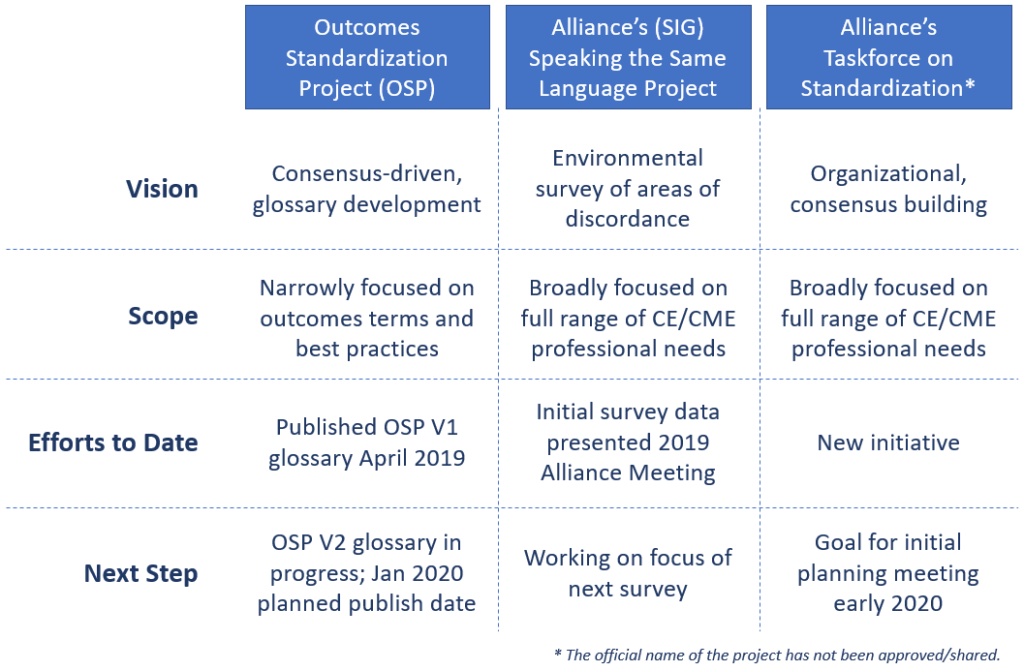The need to standardize what and how our profession does our jobs is hardly a new reality.
When I began my career more than 15 years ago I joined an organization that had been providing medical education for more than a decade, and I was tasked with exploring their outcomes and improving not only the impact of their educational activities but also their understanding of the impact they had had - ultimately telling the story of the value proposition of medical education.
Shortly thereafter I started one of the first CME blogs, known as the CME Advocate, the focus of which was to explore the challenges of outcomes and to highlight and advocate for those community members and organizations that were leading the charge.
For context, within the organization in which I worked, I was increasingly frustrated with the challenges of aggregating and analyzing large data sets of outcomes because of the lack of consistency and lack of standardization in the process, terms, and definitions. Simply put, the science could not evolve...
Fast forward a few years and I join a small commercial supporter and I'm tasked with providing educational grants to dozens of different educational providers and I am immediately confronted by the reality that the variation I saw within one organization is magnified exponentially across organizations - making it nearly impossible to understand the comparative value of different interventions or the overall value of the grant-making that our organization was doing. Simply put, our organization could not effectively support the HCP providers and patients...
Fast forward a few more years and I am back on the provider side and while, by that time, some internal processes/definitions were becoming standardized within the walls of the organization, we were now being asked by dozens of supporters to present different data points with different definitions at different times - often tripling or quadrupling the hours and resources that were being applied to the process. Simply put, our organization could not thrive...
To be clear, 15+ years ago there was already a buzz at annual meetings that, for each of the reasons above, the lack of standardization was undermining the evolution and development of the profession. But there were few comprehensive efforts in place to solve the problem and those that did take foot, failed. So we might ask ourselves, why?
With a little reflection it's obvious that while the community at large has vocally advocated for standardization for nearly two decades, the urgency has not overcome the status quo inertia.
Perhaps more critically, there were then and still remain now on-going turf wars over who should lead, take ownership, or even profit off of the standardization efforts; and other groups that actually benefit from the ambiguity caused by the lack of standardization.
But today is New Day.
There are now three ongoing efforts aimed at standardizing the taxonomies of the profession, including, but not limited to outcomes analysis, processes, and definitions. And while these different efforts have not been optimally aligned over the last 15 months there remain incredible opportunities for collaboration and alignment.
So here is what we now can share!
Leading up to the fall CBI CME Summit in Philadelphia the OSP steering team worked with leaders of the Alliance’s Special Interest Group on CE Provider/Supporter Interactions, and more broadly the Alliance Leadership to more purposefully communicate and align on-going efforts to standardize the language and methods employed by the professional community.
On September 17th these leaders then co-presented a session at the Summit in which we laid out the vision, scope, efforts to date, and next steps for each of these projects. For those who were not able to attend the session, here is a summary of what was presented:

While not speaking on behalf of the Alliance Speaking the Same Language Project or the new Taskforce, the OSP Steering Team believes that aligning these efforts continues to be in the best interest of our professional community – and we believe that this feeling is mutual. To this point, we have a commitment from the Alliance that the OSP Steering Team will be invited to participate in the Taskforce meeting along sides of other professional organizations (i.e., ACCME, SACME, etc.) and in these conversations we hope to be able to share real-world evidence of how the community is leveraging the OSP glossary!
In the coming week and months, to continue to move the efforts forward, we will be seeking lessons from you! Stay tuned for opportunities to share your feedback…
And finally, as always, if you are looking to volunteer and contribute to the development of the OSP glossary, please let us know by submitting your thoughts and comments here!
